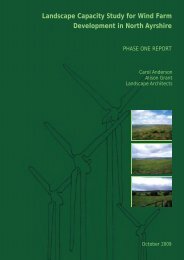Combined Executive Agenda 120410.pdf - North Ayrshire Council
Combined Executive Agenda 120410.pdf - North Ayrshire Council
Combined Executive Agenda 120410.pdf - North Ayrshire Council
You also want an ePaper? Increase the reach of your titles
YUMPU automatically turns print PDFs into web optimized ePapers that Google loves.
Property type can have a significant impact on the quantities of waste<br />
generated. Generally, detached and semi-detached properties have gardens<br />
and may generate a significant quantity of green waste. The type of housing<br />
can also impact upon kerbside collection schemes in terns of storage issues<br />
and participation rates. The distribution of housing types in <strong>North</strong> <strong>Ayrshire</strong> as<br />
shown in the table 1.1 below.<br />
Table 1.1: Housing Types in <strong>North</strong> <strong>Ayrshire</strong><br />
<strong>North</strong> <strong>Ayrshire</strong> Scotland<br />
Detached 20% 21%<br />
Semi-detached 21% 20%<br />
Terraced 31% 21%<br />
Flat 28% 38%<br />
Unknown 0% 1%<br />
Terraced houses and flats comprise 59% of the total housing stock and may<br />
therefore pose issues in relation to internal and external storage space and<br />
methods of containment and collection.<br />
1.3.4 Propensity to Recycle<br />
Encouraging the public to participate in recycling and composting collections<br />
is the key to successful schemes. There are many factors which can affect<br />
public participation, including:<br />
� Timing and Frequency of collections;<br />
� Collection container size and type;<br />
� The types of material targeted by the scheme;<br />
� Method, timing and frequency of advertising campaigns.<br />
Numerous research projects have been carried out to identify links between<br />
recycling habits and socio-demographic factors. There is strong evidence to<br />
suggest that people who live in private, semi-detached or small detached<br />
properties are more likely to recycle than those living in local authority housing<br />
or larger detached properties. The lowest proportions of recyclers are usually<br />
found amongst residents of terraced properties and flats. Generally, more<br />
mature and retired people are more likely to recycle than younger adults,<br />
especially those with young children. There is a strong correlation between<br />
the economic prosperity of an area and sustainable waste management<br />
practices.<br />
These are some of the many variable factors which affect recycling<br />
participation levels. It is important to determine and be aware of how different<br />
households may respond to waste management and recycling initiatives.<br />
4<br />
42










